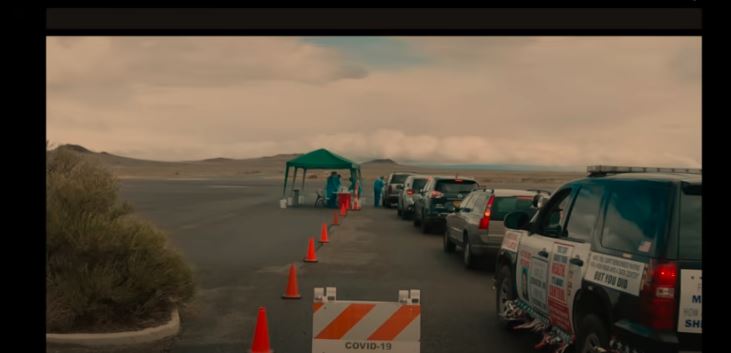Ari Aster’s Eddington takes viewers on a twisted ride through the turmoil of a small American town during the height of the pandemic. The film’s ending, as expected from Aster, doesn’t just tie up loose ends—it leaves us grappling with its unsettling and politically charged conclusion.
At the center of this narrative is Joe Cross (Joaquin Phoenix), the sheriff of Eddington, New Mexico, who is caught in a web of personal and political chaos. As the movie reaches its climax, Joe’s journey from a small-town sheriff to a broken, incapacitated mayor paints a grim picture of the consequences of fear, paranoia, and unchecked power.
Joe Cross’s Fall from Grace
By the time Eddington reaches its end, Joe Cross has transformed from an embattled sheriff to a symbol of despair. His dreams of power, control, and community protection are shattered after a violent confrontation leaves him brain-damaged and unable to speak. What started as a battle against public health measures during the pandemic turns into a violent quest for political and personal power.
Joe’s victory in the mayoral race, though seemingly a triumph, comes at a steep cost. Now a mere figurehead, he is controlled by the very forces he once fought against, highlighting the eerie metaphor Aster creates about the price of political and social manipulation.
A Shift in Power and Control
The film’s ending reveals the true power dynamics at play in Eddington. The once hopeful town, under Joe’s leadership, is now overshadowed by the omnipresent influence of corporate interests. The opening of Solidgoldmagikarp’s data center signals a future where big tech and corporate elites hold sway over the community’s fate. Joe’s transformation from sheriff to powerless figurehead serves as a chilling commentary on the subjugation of local governance by global, corporate powers.
This twist in the film’s conclusion exposes the bleak reality that despite Joe’s best efforts, his ideal of protecting the community is ultimately sidelined by larger, impersonal forces. Aster’s use of this corporate control symbolizes the future many fear—one where the real battles are fought not in the streets, but in the boardrooms and data centers that shape society.
Political and Personal Failure Collide
In Eddington, Joe’s personal and political failures are intricately linked. His violent actions—driven by a need to feel in control—serve as a backdrop for the collapse of his marriage, his career, and his very sense of identity. His manipulation of public perception, the spreading of false narratives, and his willingness to scapegoat others for his mistakes ultimately backfire.

As the film unfolds, Joe becomes more isolated, relying on manipulation and violence to prop up his fragile sense of self. His actions mirror the toxic politics of the time, where disinformation, scapegoating, and division lead to destruction. The final scenes—where Joe is left powerless and humiliated—serve as a stark reflection of the consequences of living in a world of false narratives.
The Dark Humor and Satire of Aster’s Vision
Ari Aster’s Eddington is not just a psychological thriller; it’s a biting political satire. Through Joe’s descent into madness, Aster critiques the political polarization that marked the early years of the 2020s. From the rise of conspiracy theories to the deepening divide between left and right, the film exposes how these forces shape individuals and communities.
The film’s dark humor is evident throughout, particularly in its portrayal of the lengths to which Joe and other characters go to justify their actions. Aster’s trademark mix of absurdity and grim reality underscores the film’s deeper message: that the political and social battles of today are often won not through truth, but through manipulation, violence, and power.
The Bigger Picture: America’s Fractured Reality
In the end, Eddington isn’t just about Joe Cross—it’s about the larger forces that define American life. The film illustrates how individuals like Joe, who believe they are fighting for the good of their community, can easily become pawns in a game they don’t understand. Aster’s critique of the false equivalency in American politics—where all sides are portrayed as equally flawed—challenges viewers to reconsider the narratives they’ve been fed and the way those narratives shape their reality.
Joe’s story is a metaphor for the growing sense of disillusionment and helplessness felt by many. His eventual downfall, marked by his paralysis and complete loss of agency, reflects the ultimate futility of trying to fight against a system that is much bigger and more powerful than any individual. Aster’s chilling vision is one where the very forces Joe feared and fought against—the corporations, the media, the tech giants—ultimately shape his destiny, leaving him to rot in the shadows.
A Cautionary Tale
The ending of Eddington is a brutal reminder of the consequences of unchecked power, political extremism, and the collapse of shared truth. Through Joe Cross’s tragic arc, Aster paints a bleak picture of a world where the lines between right and wrong are blurred, and where the pursuit of power leads to self-destruction.
By the film’s end, Joe is left a broken man—his physical and emotional collapse serving as a reflection of the fractured society he helped create. In a world driven by fear, division, and disinformation, Eddington offers a darkly satirical commentary on the cost of living in a world where everyone is fighting for control, but no one truly has it.
As we watch Joe’s tragic fate unfold, we are reminded of the deeper forces at play in our own world—forces that, like the characters in Eddington, may not be as easily controlled as we might hope.
